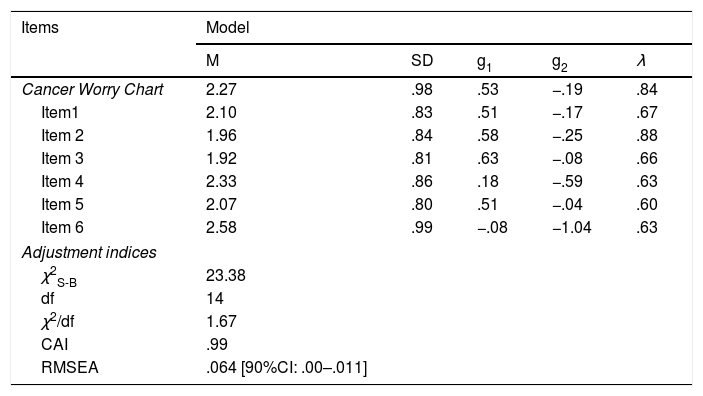To translate into Spanish and evaluate the evidence of content validity, construct validity and reliability of the Cancer Worry Chart as a single item measure of worry for cancer.
MethodThe Spanish translation of the Cancer Worry Chart was done with the back-translation procedure. The participants were 165 healthy people with a family history of cancer who responded to the Cancer Worry Chart and the Cancer Worry Scale (CWS).
ResultsTranslation back-translation allows a Spanish version of the Cancer Worry Chart whose content is clear, coherent and relevant (V>.70). Evidence of construct validity is reported based on 3 criteria: (a) an adequate adjustment of the one-dimensional model formed by the Cancer Worry Chart and the items of the CWS performed with the structural equations method (χ2S-B=23.38; df=14; χ2S-B/df=1.67; CFI=.988; RMSEA=.064); (b) a significant correlation between the Cancer Worry Chart and the CWS (r=.76 [IC95%: .68–.90]); (c) ascending averages in the CWS score as the groups formed by each response option of the Cancer Worry Chart express a greater degree of worry (F=55.72; p=.000; ω2=.57). The reliability of the Cancer Worry Chart is above what is recommended (αsingle item=.84).
ConclusionThe Spanish version of the Cancer Worry Chart showed satisfactory evidence of content validity, construct validity and reliability to measure, briefly, quickly and generally, the worry for cancer in healthy people with a family history of cancer.
Traducir al español y evaluar las evidencias de validez de contenido, validez de constructo y confiabilidad del Cancer Worry Chart como medida de ítem único de la preocupación por el cáncer.
MétodoLa traducción al español del Cancer Worry Chart se realizó con el procedimiento de traducción inversa. Los participantes fueron 165 personas sanas con historia familiar de cáncer quienes respondieron el Cancer Worry Chart y la Cancer Worry Scale (CWS).
ResultadosLa traducción inversa permite tener una versión en español del Cancer Worry Chart cuyo contenido es claro, coherente y relevante (V>0,70). Se reporta evidencia de validez de constructo en base a 3 criterios: a) un ajuste adecuado del modelo unidimensional conformado por el Cancer Worry Chart y los ítems de la CWS realizado con el método de ecuaciones estructurales (χ2S-B=23,38; df=14; χ2S-B/df=1,67; CFI=0,99; RMSEA=0,064); b) una correlación significativa entre el Cancer Worry Chart y la CWS (r=0,76 [IC95%: 0,68-0,90]); c) promedios ascendentes en la puntuación de la CWS a medida que los grupos conformados por cada opción de respuesta del Cancer Worry Chart expresan un mayor grado de preocupación (F=55,72; p0,000; ω2=0,57). La confiabilidad del Cancer Worry Chart está por encima de lo recomendado (αítem único=0,84).
ConclusionesLa versión en español del Cancer Worry Chart mostró evidencias satisfactorias de validez de contenido, validez de constructo y confiabilidad para medir, de manera breve, rápida y general, la preocupación por el cáncer en personas sanas con antecedentes familiares de cáncer.









